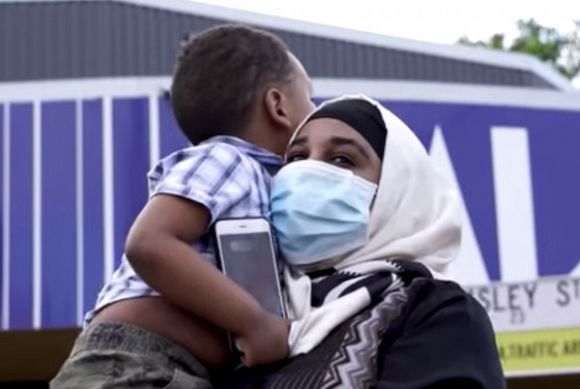Two asylum seekers have been moved to a high-security facility in Brisbane. They have vowed to not eat until better conditions are met, writes Michael Williams.
ADNAN AND MEDHI are best friends and cousins. They have been detained by the Australian Government since they were 15. After eight years of white walls and limited freedoms, at 2 am on 19 July, they attempted suicide.
The pair, 22 and 23, were being held at the Kangaroo Point Central Hotel. 24 hours a day, protesters are hitched outside of the hotel. They demand that the men be given their freedom.
Their suicide attempts were only a few hours apart from each other. They were then rushed to Brisbane's Princess Alexandra Hospital.
That morning marked the beginning of the pair’s eighth year in detention. Adnan, the younger of the two, complained to protesters that the International Health and Medical Services (IHMS) – a contracted organisation responsible for their well-being – had not been appropriately listening to the concerns of the asylum seekers, wearing masks or following relevant COVID-19 safe procedures.
This comes after a guard had tested positive for COVID-19 in April.
How protesters caught wind of the movements of Adnan and Medhi is unclear. They soon found out that Adnan and Medhi were being moved from the hospital to the Brisbane Immigration Transit Accommodation (BITA). Protesters rallied to blockade the front gates of the site. Emotions were tense and protesters locked their hands to the wheels of their cars.
To the dismay of the protesters, the asylum seekers had been snuck in through the military base that exists at the back of the site.
The protesters were disheartened and many retreated to emotional wellbeing gatherings.
On 23 July, Farhad Rahmati, an outspoken asylum seeker, was rushed to the Royal Brisbane Hospital for heart problems. Farhad has become infamous as one of the more vocal detainees, even guest appearing on 4zzz FM.
Rahmati was the first detainee to be taken to BITA in April. His transfer was the catalyst for the 24-hour blockade of the Kangaroo Point Central Hotel. He states that the harshness of his treatment in BITA has caused his heart condition.
When protesters met him, he was chained to his hospital bed.
On 31 July, Adnan was moved from the Hamilton, or “residential”, compound to the higher security Moreton compound. In the Hamilton compound, the asylum seekers are afforded small freedoms and recreational activities. The Moreton compound, however, is used for 'single separation' and is supposed to be meant for dangerous individuals.
Adnan will not be treated so well in the Moreton compound.
Protesters say that this may be due to Adnan's public complaints about the failures of IHMS.
One protester had the following to say:
“Get it right, they were moved to high-security cells as punishment for complaining about poor medical treatment. Now guards are actively agitating them, trying to force behaviour that could be used to move them to even higher security cells, which have no windows.”
After losing his cousin and best friend, Medhi asked to be moved to Moreton to join Adnan. Shortly after, they started a hunger strike.
“I could still move to have a smoke; I just feel my body is trembling. I will continue to fight my desire to eat, so then my soul will be free to fight,” says Medhi about the strike.
He said, further:
“Day three of the hunger strike. I feel like I'm losing weight, my stomach hurts, I have a severe headache and I can't move, but the funny thing is that I don't feel hungry.”
Rahmati joined in the hunger strike a few days after Adnan and Medhi. Rahmati vows to not eat again until Adnan is returned to the residential site.
Refugee Advocate Dane de Leon says:
“They need to be released into the community. They aren’t going to get any better. They cannot recover in the same place that tortures them.”
Former Nauru nurse and whistleblower Jacinta O’Leary, who worked with Adnan and Medhi, has urged people to do anything they can to help “these young men” and has urged us to think of them as our children.
Australian Border Force commented:
Detainees are routinely moved between facilities to ensure the safety and wellbeing of both detainees and service provider staff.
Detainees in immigration detention are provided food, access to medical care, educational programs, cultural, recreational and sporting activities, internet and computer facilities, televisions, and clean, comfortable sleeping quarters.
They did not comment on the hunger strike undertaken by Rahmati, Adnan and Mehdi.
You can follow Michael Williams on Twitter and Instagram @editorscribble.
Related Articles
- Protesters camp out the Kangaroo Point Central Hotel to free asylum seekers
- Refugee advocates defend convoy protest as fears grow for detainees
- No luck for asylum seekers in the 'lucky country'
- Do unto refugees
- Australia’s opaque offshore asylum policy on Nauru
 This work is licensed under a Creative Commons Attribution-NonCommercial-NoDerivs 3.0 Australia License
This work is licensed under a Creative Commons Attribution-NonCommercial-NoDerivs 3.0 Australia License
Support independent journalism Subscribe to IA.
















